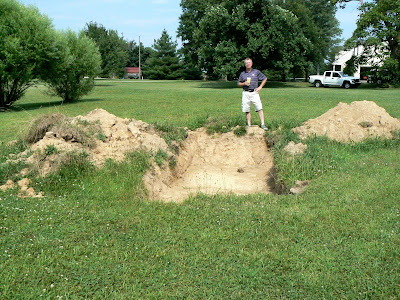21.8.16
WE'RE BAAACK!
After a couple of years of side-tracks (barn remodel, swimming pool, fence, fire pit, pergola), the bridge construction will resume this fall (2016). Remember, Washington Roebling took time out for the Civil War during the Cincinnati Bridge construction.
Looks like standard concrete block and standard split-face block will be used -- two wall thicknesses up to 8 ft and 1 wall thickness from there up.
Split-face LW 8x8x16 run about $1.70 ea.
Lightweight 8x8x16 about $1.40 ea.
LW split-face corner about $2.65 ea.
One tower up to 8 ft roadway = $730 + mortar & sand
Here we go!
1.8.12
Caisson Footers Poured
In June of 2012 after letting the project take it’s natural
course, local Randy Brown and crew dug out the foundation pits and prepared
them for concrete.
The pits are filled with 15 yards (45,000#) of 3500psi concrete.
Horizontal rebar was put in to strengthen the base, and vertical rebar was
installed to anchor the towers to the foundation.
My local block/brick/stone mason artisan “Isabell” and I will
wait for cooler weather and (my) saving up some more cash before I proceed.
- Reported July 2012 by Doug aka “Washington”, Head
Engineer for BBIMBY
South/Brooklyn Side Foundation and the Ghost Shadow of Washington Roebling
Saxonburg,
John A. Roebling's original house
Model
of the BB built in a park on the site of the original outdoor wire rope
"factory".
Caisson
In geotechnical engineering, a caisson is a retaining, watertight structure
used, for example, to work on the foundations of a bridge pier, for the
construction of a concrete dam, or for the repair
of ships.
30.5.10
Facts from Steve Anderson's
Crossings of New York about the Brooklyn Bridge
Type of bridge ……………………………………… Suspension
Construction started ……………………………… January 3, 1870
Opened to traffic …………………………………… May 24, 1883
Length of main span ……………………………… 1,595 feet, 6 inches
Length of side spans ………………………………… 930 feet
Length, anchorage to anchorage …………………… 3,455 feet, 6 inches
Total length of bridge and approaches ……………… 6,016 feet
Width of bridge ……………………………………… 85 feet
Number of traffic lanes ……………………………… 6 lanes
Number of cables …………………………………… 4 cables
Height of towers above mean high water …………… 276 feet, 6 inches
Clearance at center above mean high water ……… 135 feet
Length of each of four cables ……………………… 3,578 feet, 6 inches
Diameter of each cable ……………………………… 15 ¾ inches
Number of wires in each cable ……………………… 5,434 wires
Total length of wires ………………………………… 14,060 miles
Total masonry in towers ……………………………… 85,159 cubic yards
Weight of suspended structure ……………………… 6,620 tons
Total weight of bridge ……………………………… 14,680 tons
Cost of original structure …………………………… $15,100,000


The work of excavation for the Caissons begins,
BBIMBY Groundbreaking Date, Monday May 24th, 2010
Backhoe Operation by Team Member Doug Knoblock
Organization chartered to build the Brooklyn Bridge - The New York Bridge Company
President signing bill approving the Broolkyn Bridge plan, 1869 - Ulysses S. Grant
Date work began on Bridge - 2 January 1870, clearing the site for the Brooklyn Tower
Depth of Brooklyn caisson - 44'-6" feet below mean high tide,
bearing on consolidated materials (bedrock at 90 feet) (DBS)
Design weight supported by Brooklyn Caisson - 80,000 tons (DBS)
Thickness of top of Brooklyn wooden caisson - 15 feet of yellow pine. (DBS)
Brooklyn caisson launched from Greenpoint shipyard (5 miles North) - 19 March 1870
Launching Size of Brooklyn Caisson - 168' x 102' x 14½'
Launching Weight of Brooklyn Caisson - 3000 tons
Organization chartered to build the Brooklyn Bridge - The New York Bridge Company
President signing bill approving the Broolkyn Bridge plan, 1869 - Ulysses S. Grant
Date work began on Bridge - 2 January 1870, clearing the site for the Brooklyn Tower
Depth of Brooklyn caisson - 44'-6" feet below mean high tide,
bearing on consolidated materials (bedrock at 90 feet) (DBS)
Design weight supported by Brooklyn Caisson - 80,000 tons (DBS)
Thickness of top of Brooklyn wooden caisson - 15 feet of yellow pine. (DBS)
Brooklyn caisson launched from Greenpoint shipyard (5 miles North) - 19 March 1870
Launching Size of Brooklyn Caisson - 168' x 102' x 14½'
Launching Weight of Brooklyn Caisson - 3000 tons
Subscribe to:
Comments (Atom)







